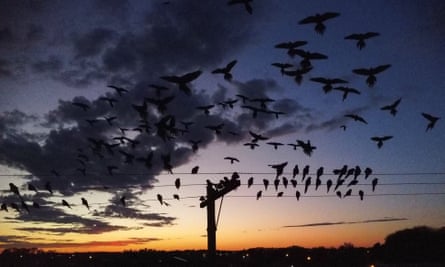The town of Hilario Ascasubi near Argentina’s eastern Atlantic coast has a parrot problem.
Thousands of the green, yellow and red birds have invaded, driven by deforestation in the surrounding hills, according to biologists. They bite on the town’s electric cables, causing outages, and are driving residents around the bend with their incessant screeching and deposits everywhere of parrot poo.
“The hillsides are disappearing, and this is causing them to come closer to the cities to find food, shelter and water,” biologist Daiana Lera said, explaining that much of Argentina’s forest land has been gradually lost over the years.
In the past few years, the parrots have started to arrive, seeking refuge in the town through autumn and winter. At times, according to locals, there are up to 10 parrots for each of the town’s 5,000 human inhabitants. During the summer, the birds migrate south to the cliffs of Patagonia for the breeding season.
Images show hundreds of birds perched along electric cables and on pylons, or silhouetted in the dusk light swarming over buildings and a church, eerily reminiscent of scenes in film director Alfred Hitchcock’s classic 1963 thriller The Birds.

“They bite and damage the cables. Water can then get into the wires when it rains and transmission is cut off. These parrots create daily costs and problems for us,” said Ramón Alvarez, a local journalist for Radio Taxi Fm. “It goes without saying that when the power goes out, there is no radio.”
Residents have tried various methods to scare them away, such as noise and laser lights, but nothing has worked.
“We need to start to restore our natural environments,” Lera said. “But until that happens, we have to think of strategies that allow us to live together in the most harmonious way possible in our towns.”
Source: theguardian.com


